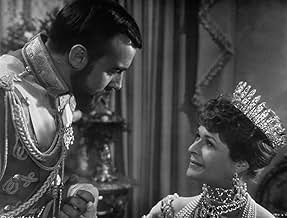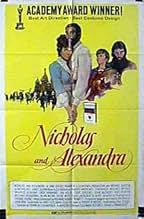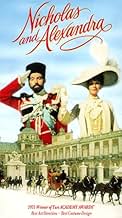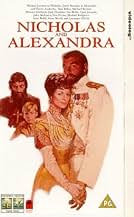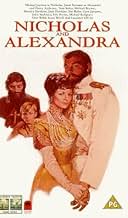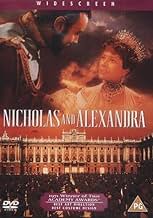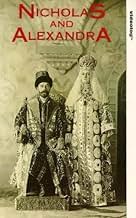O czar Nicolau II, o último monarca inepto da Rússia, insensível às necessidades de seu povo, é deposto e exilado para a Sibéria com sua família.O czar Nicolau II, o último monarca inepto da Rússia, insensível às necessidades de seu povo, é deposto e exilado para a Sibéria com sua família.O czar Nicolau II, o último monarca inepto da Rússia, insensível às necessidades de seu povo, é deposto e exilado para a Sibéria com sua família.
- Direção
- Roteiristas
- Artistas
- Ganhou 2 Oscars
- 3 vitórias e 11 indicações no total
- Direção
- Roteiristas
- Elenco e equipe completos
- Produção, bilheteria e muito mais no IMDbPro
Avaliações em destaque
Produced with lavish care and attention to detail by Sam Spiegel for Horizon Pictures, "Nicholas and Alexandra" is among the last of the great "thinking man's epics" and one of the best. This is due in no small measure to the wonderful screenplay by James Goldman. Goldman, who also scripted "The Lion in Winter" and "Robin and Marian" had a fine ear for dialogue, and "Nicholas and Alexandra" is a pleasure to listen to as well as to behold. Like Robert Bolt's "Lawrence of Arabia", Charles Wood's "Charge of the Light Brigade" and Robert Ardrey's "Khartoum", all fine historical epics, Goldman's "Nicholas and Alexandra" is elevated by an intelligent script laced with fine dialogue. Transposing history onto the screen is never an easy task, but the story of the last years of the Romanov Dynasty is well served by Goldman. He skillfully telescopes events, while still remaining basically true to historic fact. One way or another, all films dealing with history compromise fact for drama. The best of them achieve a balance between the two. Those pedants who quibble over this fact of life, please refer to the historical plays of Shakespeare for it's validation.
Among the film's many pleasures is the high level of acting by an impressive cast. Michael Jayston and Janet Suzman are simply magnificent in the lead roles. It was an uncanny and bold choice using two unknowns to star in a film of this scope, and they have no problems carrying the three hour film. Both create complex, three-dimensional characters, deeply flawed, yet appealing, sympathetic and infuriating. it is the film's unwillingness to portray them as simply victims that gives it tragic grandeur. A special note must be made of Tom Baker's performance as Rasputin. Too often in previous movies film-makers have exploited the sensational events of the man's life and nothing more. This film actually had the courage to downplay those lurid elements, striving instead for complexity of character. Here we have a tortured individual, a charlatan and a monk, lascivious yet craving spiritual redemption. The Imperial Children are also sensitively depicted, with a standout performance by Roderic Noble as the hemophiliac only son, Alexis. The internal angst he brings to the part in his later scenes is impressive. Franklin J. Schaffner's able direction keeps the film moving along, and at no time is there any danger of the film losing focus on the two leads. This was no mean feat considering the powerhouse supporting cast that included, Laurence Olivier, Michael Redgrave, Harry Andrews, Irene Worth, Jack Hawkins, Ian Holm, Michael Bryant, Brian Cox, Eric Porter, Timothy West, Peter McEnery, Julian Glover, Roy Dotrice, Maurice Denham, Alan Webb, Guy Rolfe, Steven Berkof and John Wood, all of whom do memorable turns.
In the first half of the movie, the filmmakers vividly bring to life the isolated fairy-tale world the Imperial Family inhabited. The beautiful palaces, and villas provide a striking contrast to the shabby, squalid prison quarters of the film's second half, which deals largely with the Romanov's exile and imprisonment in Siberia. The murder of the Royal Family in the basement of the Ipatiev house, the so called "House of Special Purpose" is one of the most strikingly directed scenes in the film. The brutal suddenness with which it is depicted packs quite a wallop. Filmed in Panavision, the film is gorgeous to look at. John Box's recreation of Imperial Russia at the turn of the century truly deserved it's Academy Award for Best Production Design, as did Yvonne Blake for Best Costume Design. Freddie Young's stunning cinematography and Richard Rodney Bennett's haunting music score were also nominated, though they both lost to other films. Finally it is a beautifully edited film, a marvelous example of invisible editing used to create a subtle, but powerful sense of irony. A superb film that deals intelligently with the problems inherent in transposing history onto film.
The movie is off to a slow start, and doesn't really grab the viewer until after the introduction of Rasputin. From there on in it's pure cinematic joy to witness the fate of the Tzar and his family unravel.
The actors do a tremendous job. It's obvious that the producers wanted their actors to look as much like their characters as possible, and while this doesn't necessarily strengthen the movie by itself it clearly gives it a stronger feel of authenticity. Furthermore they perfectly embody their flawed characters. The czar, beautifully played by Michael Jayston is a warm, caring man who unfortunately is totally unfit to be a czar. He is out of touch with his people, and feebly clings to his autocratic power. Jayston manages to portray an almost absurd certainty in his divine right, and ability to rule while at the same time exposing his uncertainty and fright. Janet Suzman is equally impressive as the loving, but domineering Alexandra.
The look and feel of the movie is also fantastic. The jaw-dropping visuals of Russia perfectly accommodates the story, and the music is wonderful all the way through. The pace is slow, and it's easy to see why critics who had just witnessed the exhilarating pace of movies like "A Clockwork Orange" or "The French Connection". But this was how these kinds of movies were made, and "Nicholas and Alexandra" does not shame the genre. It's actually a beautiful end to a spectacular genre which is well worth a look for anyone with a soft spot for David Lean-like movies.
Você sabia?
- CuriosidadesSir Laurence Olivier first suggested Tom Baker to be cast as Grigori Rasputin. Olivier was the director of the National Theatre in England; Baker was a member of the company.
- Erros de gravaçãoWhen the family is in the basement in the final scene, the Grand Duchesses' hairstyles are based on official photographs from 1914. In real life, when the Grand Duchesses were imprisoned, their heads were shaved due to illness. By the time they were killed in July 1918, their hair had grown to the napes of their necks.
- Citações
Tsar Nicholas II: Taking someone's life, no man should have that power.
Yurovsky: You had it.
Tsar Nicholas II: Yes. And I have learned that a strong man needs no power, and a weak man is destroyed by it. He's like a child. You don't shoot children, do you? In your new world, are there penalties for innocence?
Yurovsky: Sometimes. It takes a wise judge to know who is innocent and who is guilty. I wish I knew.
- Cenas durante ou pós-créditos"By courtesy of the National Theatre of G.B." is written underneath Tom Baker and Laurence Olivier's names in the end credits. "By courtesy of the Royal Shakespeare Company" is written underneath Janet Suzman's name.
- Versões alternativasThe present DVD issue is slightly longer than the original VHS versions and includes several scenes not featured in the earlier versions e.g. a Russian general committing suicide and more scenes of the royal family in captivity.
- ConexõesFeatured in A História Não Contada dos Estados Unidos: Chapter 3: The Bomb (2012)
- Trilhas sonorasWiegenlied (Lullaby) Op. 49 No. 4
(uncredited)
Music by Johannes Brahms
Words from Des Knaben Wunderhorn
Sung by Alexandra
Principais escolhas
- How long is Nicholas and Alexandra?Fornecido pela Alexa
Detalhes
- Data de lançamento
- País de origem
- Central de atendimento oficial
- Idiomas
- Também conhecido como
- Nicholas and Alexandra
- Locações de filme
- Empresa de produção
- Consulte mais créditos da empresa na IMDbPro
Bilheteria
- Orçamento
- US$ 9.000.000 (estimativa)
- Tempo de duração3 horas 3 minutos
- Proporção
- 2.35 : 1
Contribua para esta página




